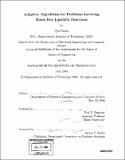Adaptive algorithms for problems involving black-box Lipschitz functions
Author(s)
Baran, Ilya, 1981-
DownloadFull printable version (2.989Mb)
Alternative title
Adaptive analysis of algorithms for problems involving black-box Lipschitz functions
Other Contributors
Massachusetts Institute of Technology. Dept. of Electrical Engineering and Computer Science.
Advisor
Erik D. Demaine.
Terms of use
Metadata
Show full item recordAbstract
Suppose we are given a black-box evaluator (an oracle that returns the function value at a given point) for a Lipschitz function with a known Lipschitz constant. We consider queries that can be answered about the function by using a finite number of black-box evaluations. Specifically, we study the problems of approximating a Lipschitz function, approximately integrating a Lipschitz function, approximately minimizing a Lipschitz function, and computing the winding number of a Lipschitz curve in R² around a point. The goal is to minimize the number of evaluations used for answering a query. Because the complexity of the problem instances varies widely, depending on the actual function, we wish to design adaptive algorithms whose performance is close to the best possible on every problem instance. We give optimally adaptive algorithms for winding number computation and univariate approximation and integration. We also give a near-optimal adaptive algorithm for univariate approximation when the output of function evaluations is corrupted by random noise. For optimization over higher dimensional domains, we prove that good adaptive algorithms are impossible.
Description
Thesis (M. Eng.)--Massachusetts Institute of Technology, Dept. of Electrical Engineering and Computer Science, 2004. Includes bibliographical references (p. 61-62).
Date issued
2004Department
Massachusetts Institute of Technology. Department of Electrical Engineering and Computer SciencePublisher
Massachusetts Institute of Technology
Keywords
Electrical Engineering and Computer Science.